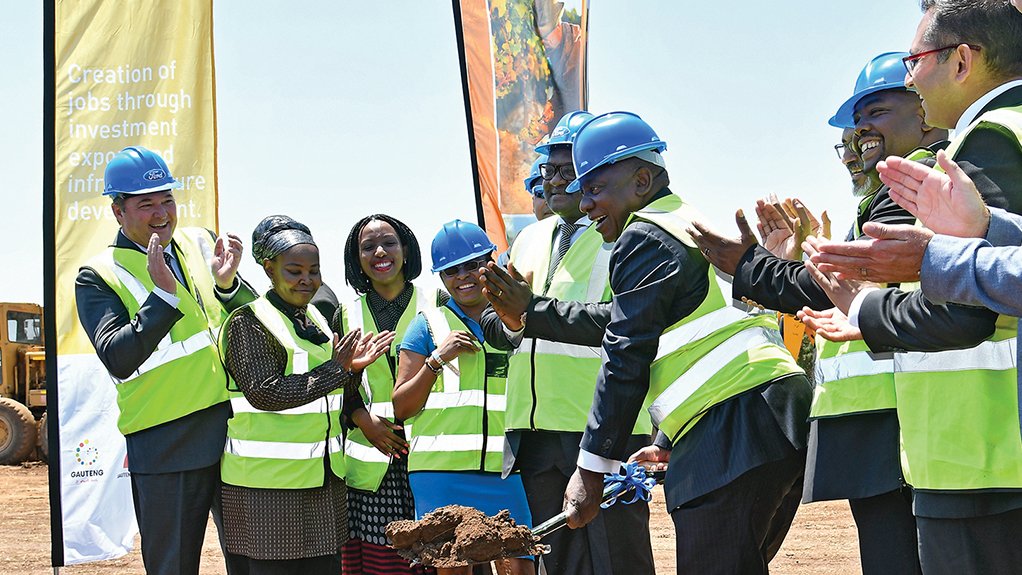Despite the challenges experienced by projects throughout the year, including Covid-19, the Tshwane Automotive Special Economic Zone (TASEZ) remains within its timeline and budget.
“The project is in the construction phase and we have broken down the project into a number of work streams that are dedicated to certain operations,” says Department of Trade, Industry and Competition SEZ chief director Maoto Molefane.
“These work streams include earthworks, which are currently under way and work streams focusing on the design, procurement of contractors and installation of engineering services for the building of factories.”
He notes that, overall, the project is within its timeline and budget. “The project is monitored on a daily basis and there are structures and processes in place if any challenges or delays arise.”
In addition to the workstreams that have been implemented to ensure that timelines are adhered to, a board and subcommittees have been established – all within a year – to mitigate potential challenges.
“Engagements have been held with the various tenants – as one of the stakeholders in this project – to agree on what elements the factories should have before they install their equipment, while other work, such as finishings, are being done.” Value engineering sessions are also continuously being held to identify optimal, economic and fast construction ways of expediting progress. Additionally, the site is accommodating two shifts a day to compensate for the festive season and Easter holidays,” says Molefane.
Several small-, medium-sized and micro enterprises (SMMEs) are also involved in the TASEZ – from those in the construction phase to the vendors that will occupy the factories.
“SMME development is a socioeconomic imperative of any government construction in South Africa. SMMEs are the largest employers in any economy and, therefore, assist with economic activity and employment. These enterprises can support many unemployed people from the ground upwards,” notes Molefane.
He states that – from preconstruction to the last stage – the involvement of SMMEs in this project is comprehensive, with the fields of specialty for construction SMMEs ranging from bulk earthworks, haul and dump operations, bush clearing, plant hire, materials supply, training service providers and cleaning, besides others.
SMMEs have to adhere to a number of regulations to bid for a tender put out by the TASEZ. They need to comply with the regulations of the Construction Industry Development Board and the South African Revenue Service, with a Central Supplier Database certificate also a prerequisite to bid for available opportunities. If these requirements, besides others, are not met, the bid will be deemed non-responsive.
“In some cases, SMMEs cannot bid for tenders because they do not meet certain required criteria. Through the development and establishment of the TASEZ, we provide further support and development for SMMEs if they do not qualify for certain tenders. We offer them training and workshops to better position themselves to bid for certain tenders.”
TASEZ currently has an SMME participation of 47%, while National Treasury has released revised Preferential Procurement Regulations stipulating that at least 30% of appropriate categories of State procurement be reserved for SMMEs.
While this 47% SMME participation is not necessarily all industry related, the TASEZ exceeds the Preferential Procurement Regulation stipulation of 30%.
The initial feasibility study for the TASEZ, conducted in 2017, stipulated 45% as the target for SMME involvement.
“This project currently includes the simultaneous construction of 12 factories. It has attracted great investor interest from the onset and the 47% SMME participation is equivalent to an investment of R1.4-billion,” Molefane explains.
Several community and corporate social responsibility programmes and initiatives are also being realised through this project.
Molefane notes that the collaboration of local, provincial and national government, as well as collaboration with and demand from the private sector, has seen appreciable SMME and community involvement, enabling much to be achieved with this project. What should have presented challenges has successfully been turned into opportunities.
“The TASEZ is developed through a partnership model that consists of the Department of Trade, Industry and Competition, Gauteng provincial government, City of Tshwane and Ford Motor Company. This is now our perfect example of a partnership arrangement that will be replicated in other provinces,” concludes Molefane.
Edited by: Zandile Mavuso
Creamer Media Senior Deputy Editor: Features
EMAIL THIS ARTICLE SAVE THIS ARTICLE
ARTICLE ENQUIRY
To subscribe email subscriptions@creamermedia.co.za or click here
To advertise email advertising@creamermedia.co.za or click here















